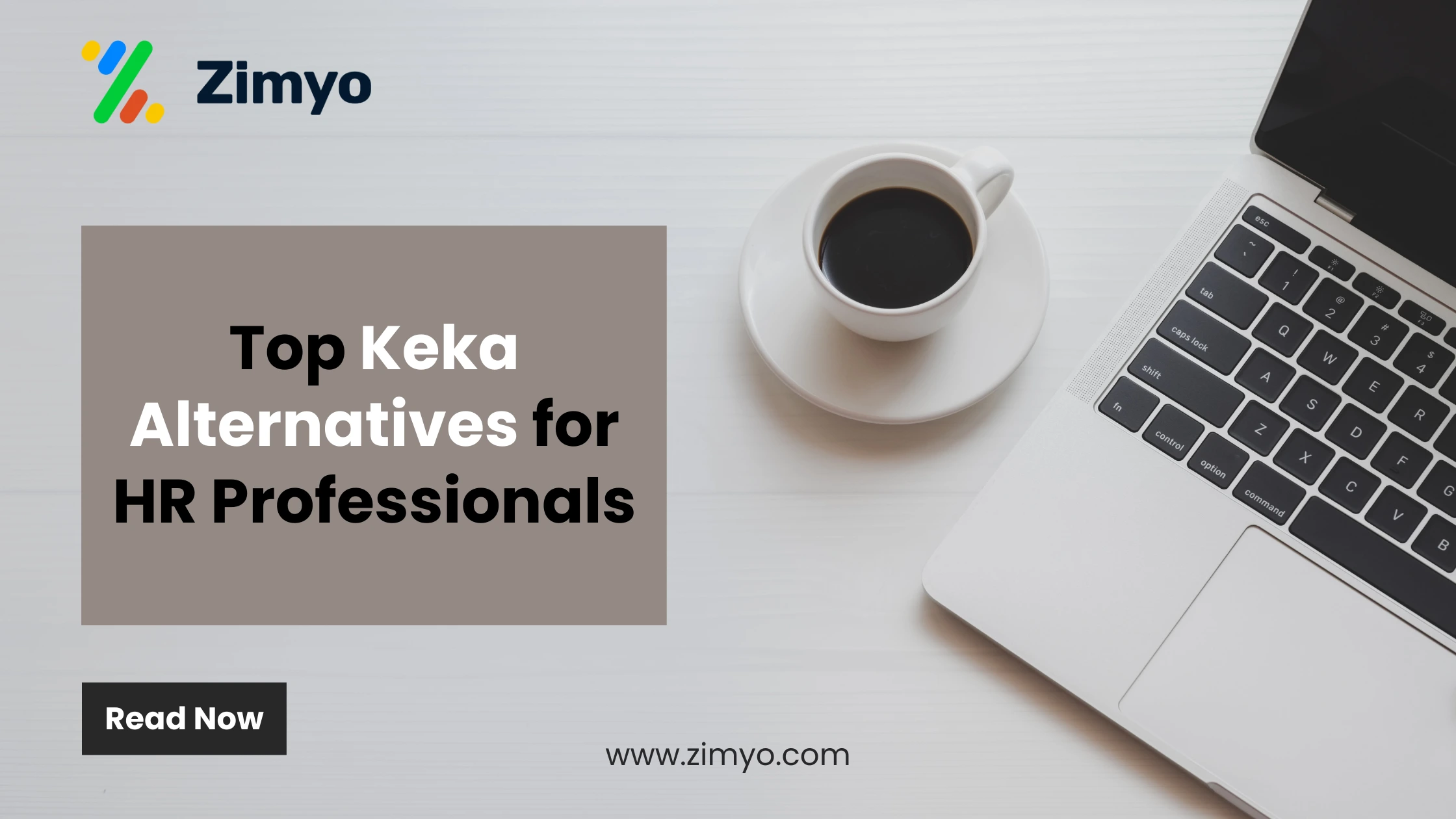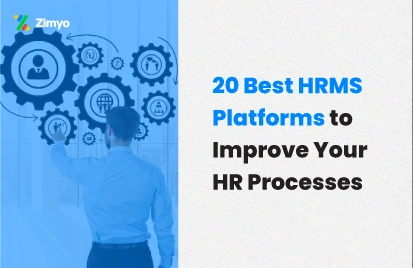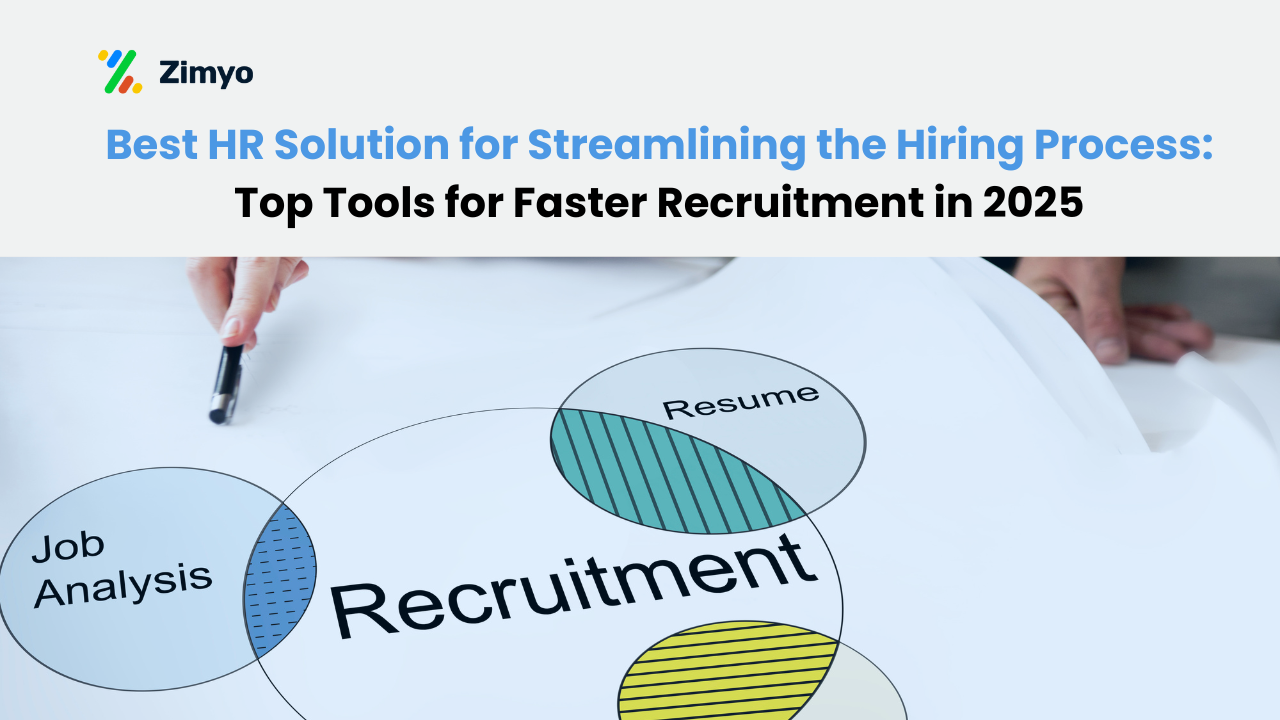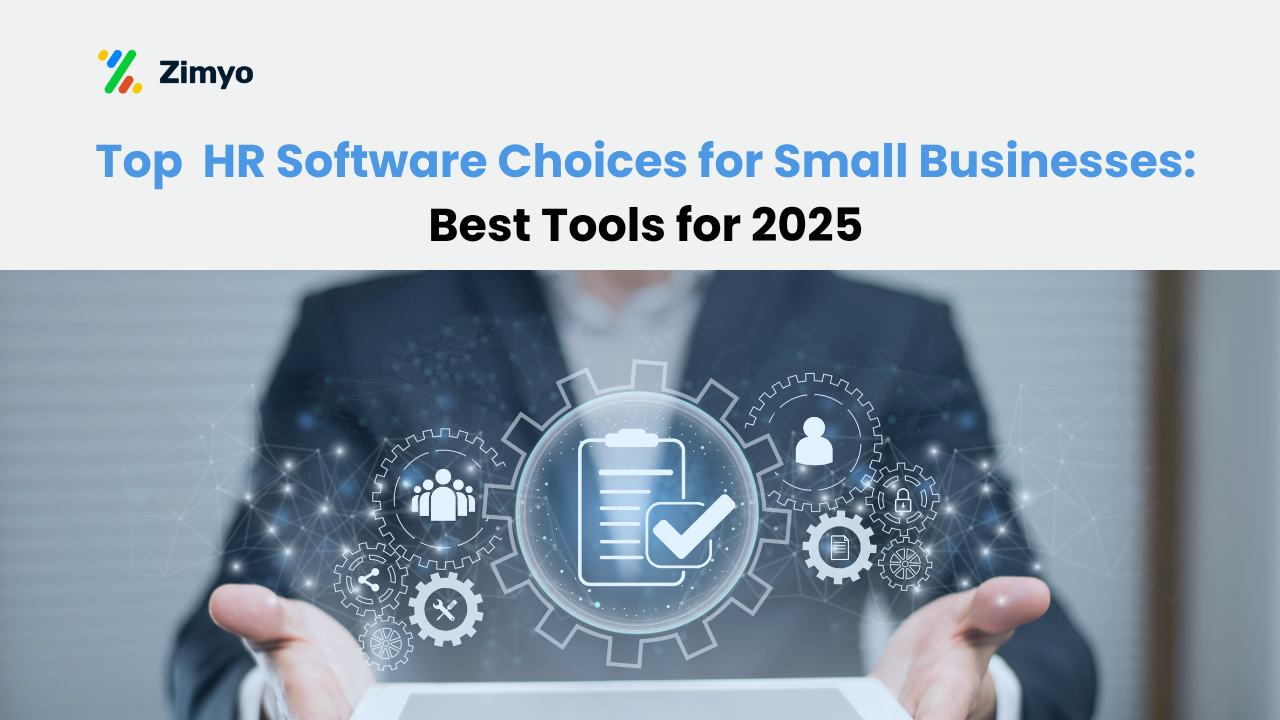Hospitality is a people business meaning – serving guests, managing employees, and delivering memorable experiences. Hotels, restaurants, resorts, and travel companies all succeed when their employees are productive and engaged. But beneath the smiles and services, hospitality HR teams struggle with significant challenges: high turnover, seasonal hiring, compliance problems, payroll complexities, and scheduling headaches.
This is where HCM software does its magic. With automation, efficiency, and intelligence infused into HR processes, hospitality companies can pay less attention to paperwork and devote more time to people.
In this blog, we’re going to look at what human capital management software (HCM) is, examine the 12 best HCM software for hospitality, and teach you how to choose the best HCM platform for your company. No matter if you’re operating a small boutique hotel, a restaurant group, or an upscale resort, the correct hospitality HR software can revolutionize the way you manage individuals and drive business growth.
What is HCM Software?
HCM software (Human Capital Management software) is an online solution to govern the entire employee lifecycle from hiring and onboarding to payroll, performance, and employee engagement.
It’s essentially a next-generation version of HRMS (Human Resource Management System). An HRMS is all about administrative functions such as attendance and payroll, while an HCM system does more. It encompasses:
- Workforce planning
- Recruitment and onboarding
- Training and learning management
- Payroll and compliance
- Performance management
- Employee engagement and retention tools
The hospitality industry sees one of the highest employee turnover rates globally—73% annually in the U.S. alone. This makes HCM software vital to streamline hiring and retention.
In the hotel industry, where the workforce demand is ever-changing and managing staff is complicated, the finest HCM software facilitates smooth business. For instance:
- Seasonal employees can be onboarded by hotels rapidly.
- Rotating shifts can be effortlessly managed by restaurants.
- Resorts can accurately pay employees across different locations.
- Managers can monitor performance and hold onto talent.
In brief, human resource management in hospitality business is more strategic and less stressful with a robust HCM platform.
Read Our Blog on Best HR Strategies in Hospitality Industry
List of Top 12 Best HCM Software for Hospitality
- Zimyo
- BambooHR
- Deel
- Paycor
- ADP
- Rippling
- Paylocity
- Workday
- ADP Workforce Now
- Gusto
- UKG Pro
- WorkTango
Best HCM Software for Hospitality: In Detail
Let’s explore the top HCM software options that are well-suited for hotels, restaurants, and hospitality groups.
1. Zimyo
Zimyo is a modern, all-in-one HCM software built to meet the diverse HR needs of today’s businesses. For the hospitality industry, it’s especially powerful because it handles bulk seasonal hiring, automates payroll, and engages frontline staff seamlessly. Whether you run a boutique hotel, a restaurant chain, or a large resort, Zimyo makes HR management in hotel industry simple and effective.
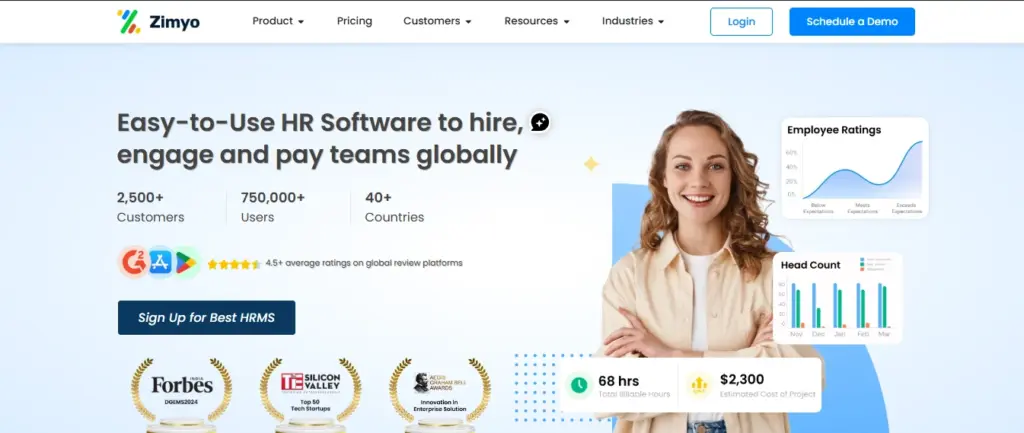
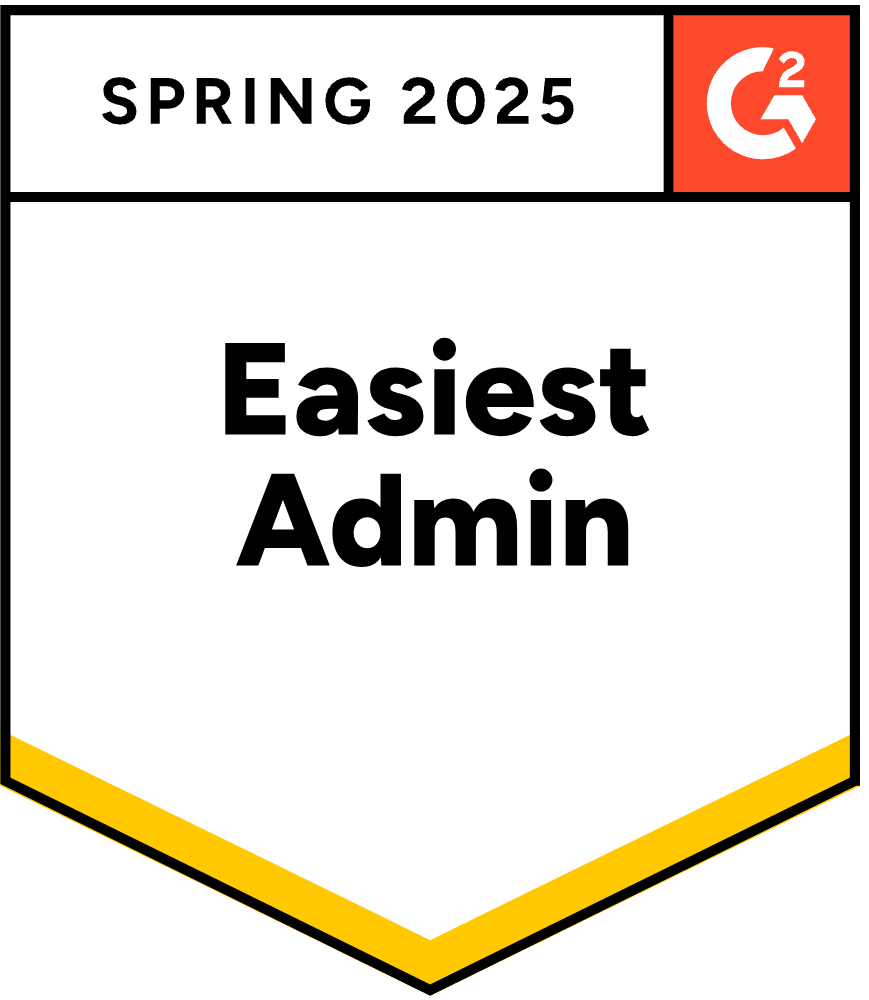
Unique Features:
- Automated payroll with compliance for Indian and global standards.
- Advanced Applicant Tracking System (ATS) for quick bulk hiring.
- Performance management with OKRs, 360° reviews, and appraisal cycles.
- Employee engagement through surveys, recognition, and rewards.
- Mobile app for staff to check shifts, apply leave, and access payslips.
- Seamless integration with attendance and time-tracking systems.
Pros | Cons |
Comprehensive HR suite covering payroll, ATS, and performance | Global payroll still expanding |
Easy-to-use interface, friendly for hospitality staff | Premium analytics require higher plans |
Affordable compared to global HCM platforms | Some integrations still being rolled out |
Strong focus on employee experience and engagement | Requires initial onboarding support |
2. BambooHR
BambooHR is a well-known human capital management software for small and mid-sized businesses. Its clean design and focus on employee experience make it a great fit for boutique hotels and small restaurants.
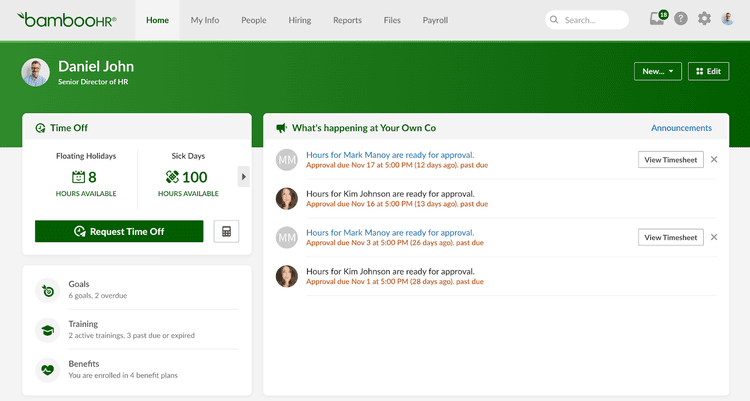
Unique Features:
- Smooth onboarding and time-off tracking.
- Reporting and analytics for better HR visibility.
Pros | Cons |
User-friendly interface | Limited global payroll options |
Affordable for small businesses | Lacks advanced enterprise features |
Strong onboarding tools | Not ideal for very large hotel groups |
3. Deel
Deel is best suited for hospitality groups with international operations. It makes hiring, compliance, and payroll seamless across multiple countries.
Unique Features:
- Global payroll in 150+ countries.
- Compliance with local tax and labor laws.
- Contractor and employee management.
Pros | Cons |
Great for global hotel chains | Expensive for small businesses |
Handles compliance automatically | Learning curve for non-tech teams |
Supports contractors and full-time staff | Limited engagement features |
4. Paycor
Paycor is a flexible HCM platform that simplifies payroll, recruiting, and scheduling, making it a strong fit for restaurants and hotels with hourly workers.
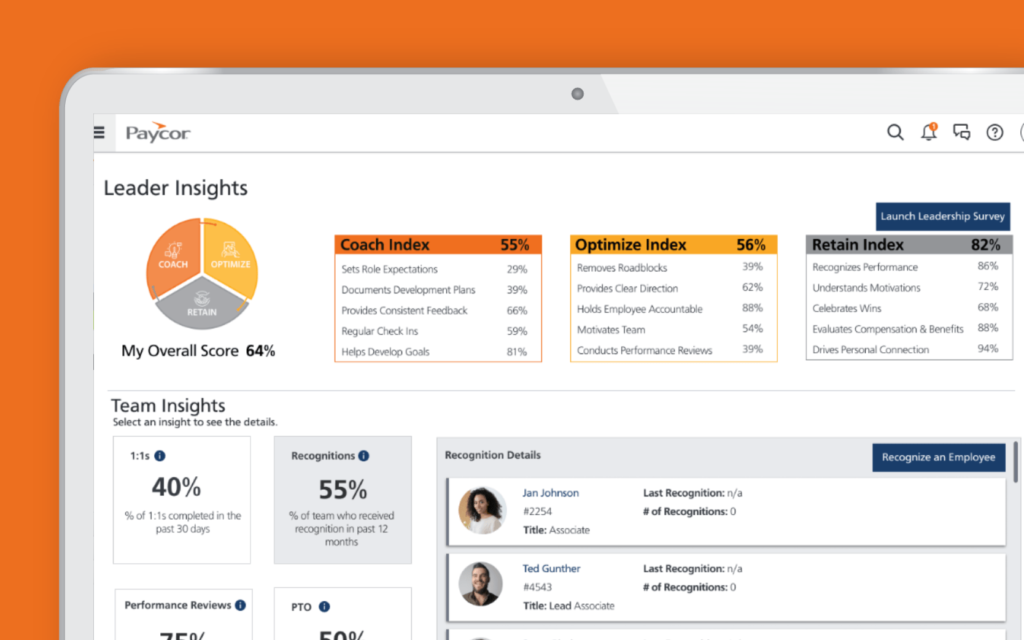
Unique Features:
- Smart scheduling for shift-based staff.
- Payroll integrated with benefits.
Pros | Cons |
Strong payroll compliance features | Interface feels dated |
Great for hourly workforce | Expensive for small hotels |
Built-in learning management | Advanced features need add-ons |
5. ADP
ADP is a trusted global leader in HR and payroll. For the hospitality industry, ADP works well for mid-to-large hotel groups that need robust compliance and payroll.
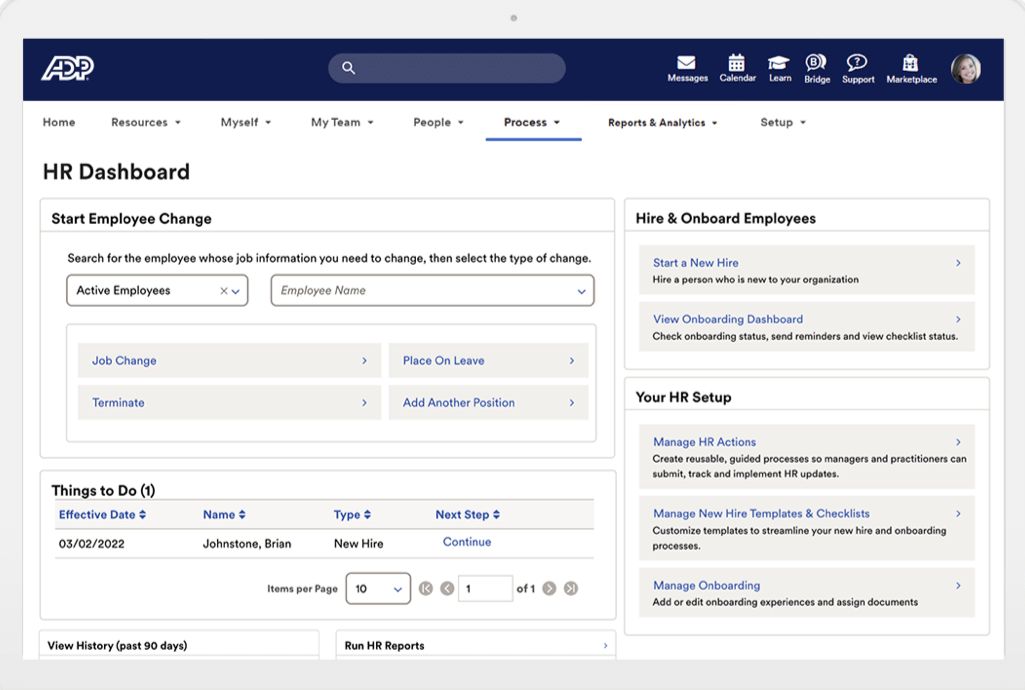
Unique Features:
- Global payroll and benefits administration.
- HR outsourcing services.
- Tax and compliance management.
Pros | Cons |
Highly reliable payroll system | Complex pricing |
Scales well for large companies | Not user-friendly for very small teams |
Excellent compliance support | Limited engagement features |
6. Rippling
Rippling combines HR, payroll, and IT into a single platform. Hospitality businesses that also manage devices and software for staff benefit most from it.
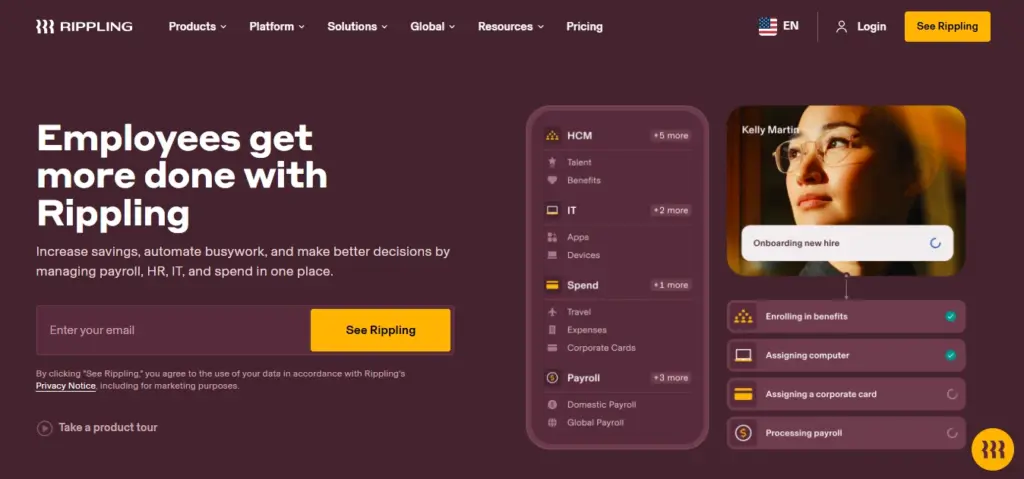
Unique Features:
Pros | Cons |
Combines IT + HR in one | Higher cost for small businesses |
Very fast onboarding | Complex for non-tech-savvy managers |
Scales globally | Limited built-in engagement tools |
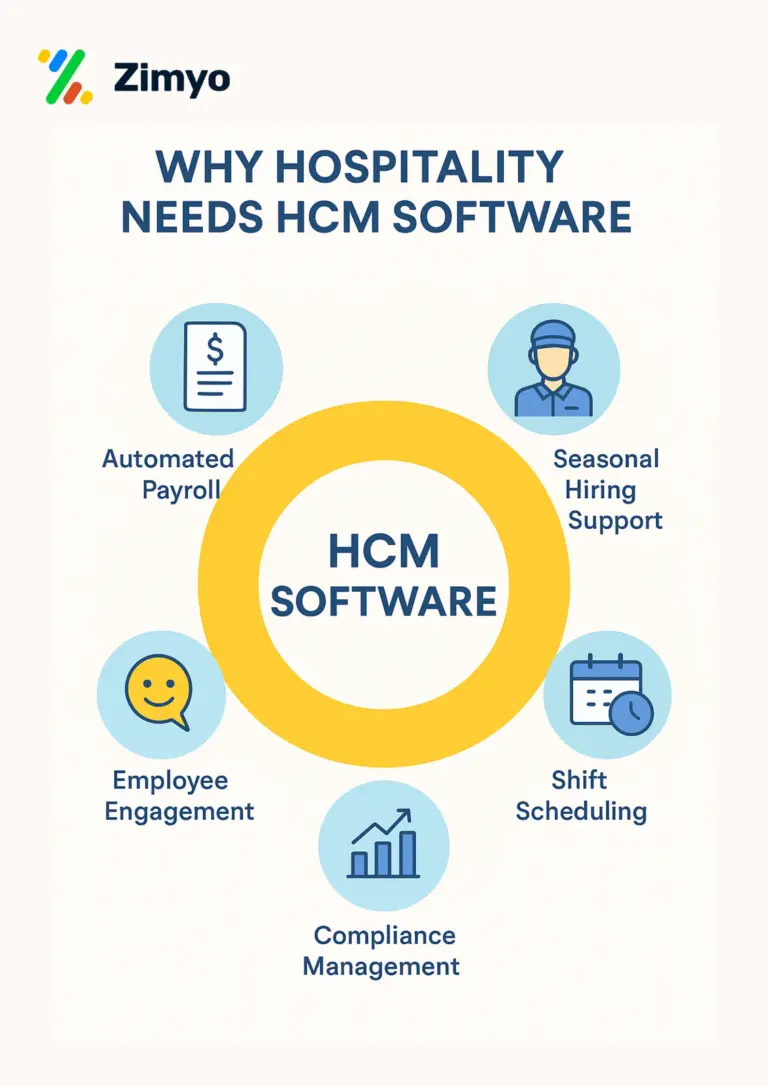
7. Paylocity
Paylocity is a balanced HCM system with payroll, workforce management, and engagement features. It works especially well for hotels focused on staff morale and culture.
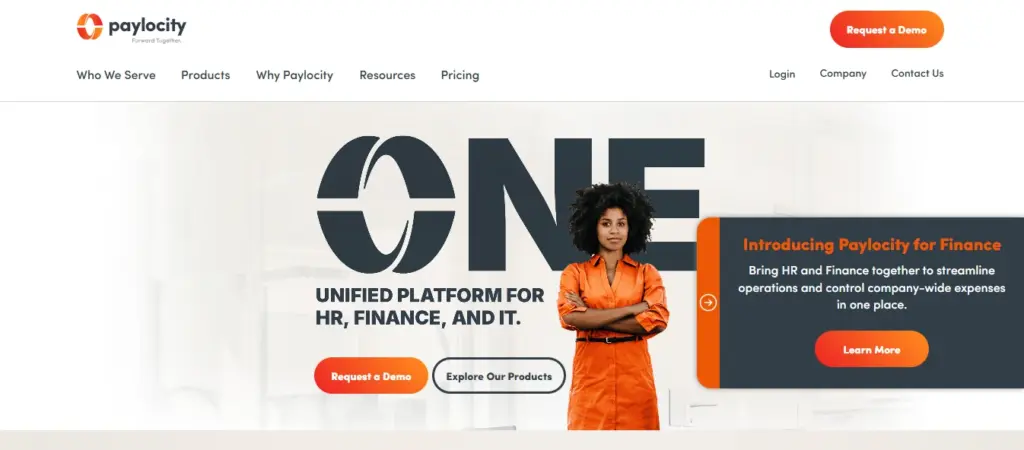
Unique Features:
- Peer recognition and engagement tools.
- Payroll and compliance.
- Mobile-first design for hospitality staff.
Pros | Cons |
Strong employee engagement tools | Costly for smaller setups |
Comprehensive payroll | Learning curve for admins |
Great mobile app | Limited global features |
8. Workday
Workday is a leading enterprise HCM platform. Large hotel chains and resorts use it for deep analytics, workforce planning, and global HR.
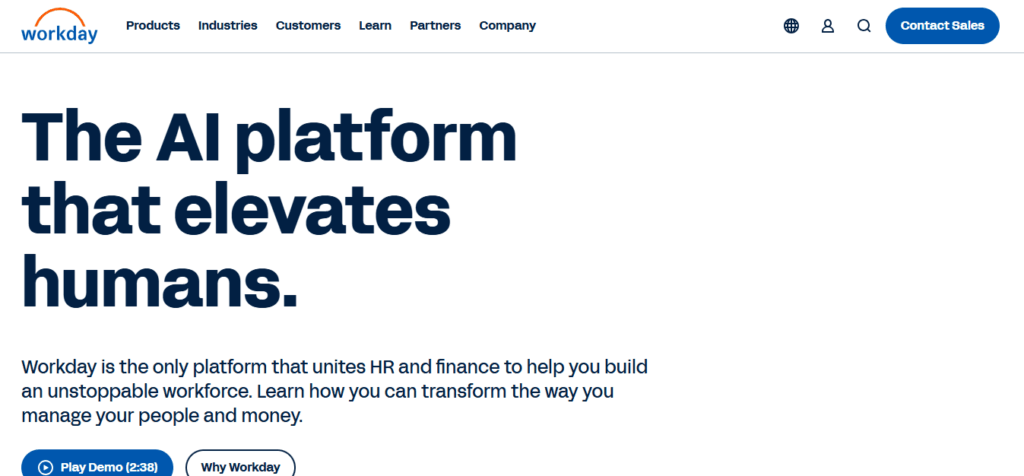
Unique Features:
- AI-powered workforce analytics.
- Recruitment and performance tracking.
- Integrated financial planning.
Pros | Cons |
Scales globally for enterprises | Very expensive |
Deep analytics and insights | Too complex for small hotels |
Integrates HR + finance | Needs significant setup time |
9. ADP Workforce Now
ADP Workforce Now is designed for mid-sized hospitality businesses. It combines payroll, compliance, and benefits into one platform.
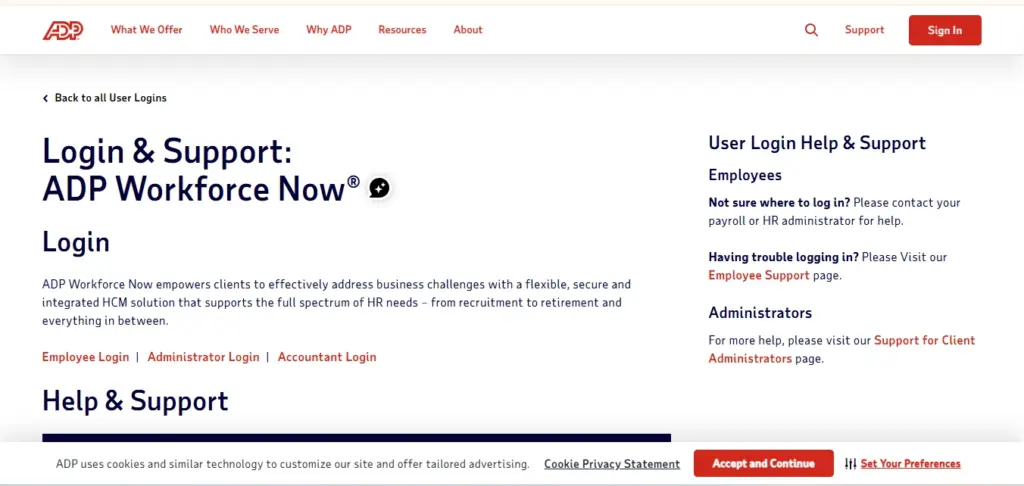
Unique Features:
- Employee self-service portal.
- Compliance and reporting tools.
- Benefits administration.
Pros | Cons |
Reliable payroll system | Expensive compared to simpler tools |
Strong compliance features | Limited customization |
Employee-friendly interface | Engagement tools not very advanced |
10. Gusto
Gusto is known for its simplicity in payroll and compliance. It’s ideal for small restaurants, cafés, or boutique hotels.
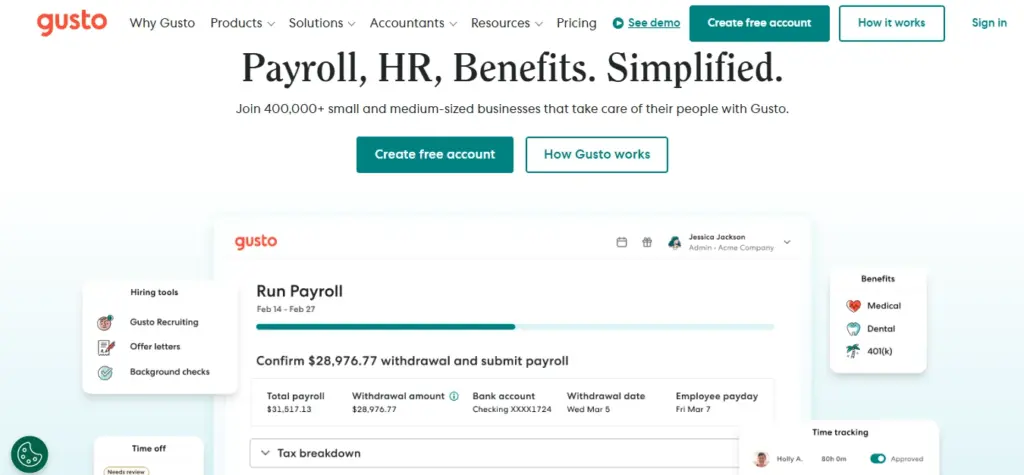
Unique Features:
- Automated tax filing.
- Simple onboarding workflows.
- Benefits management.
Pros | Cons |
Easy-to-use payroll solution | Limited for global payroll |
Affordable for small businesses | Lacks advanced HR modules |
Great for startups | Not scalable for large hotel chains |
11. UKG Pro
UKG Pro is a robust hospitality HR software built for large enterprises. Its focus on analytics and engagement makes it ideal for big resorts and hotel groups.
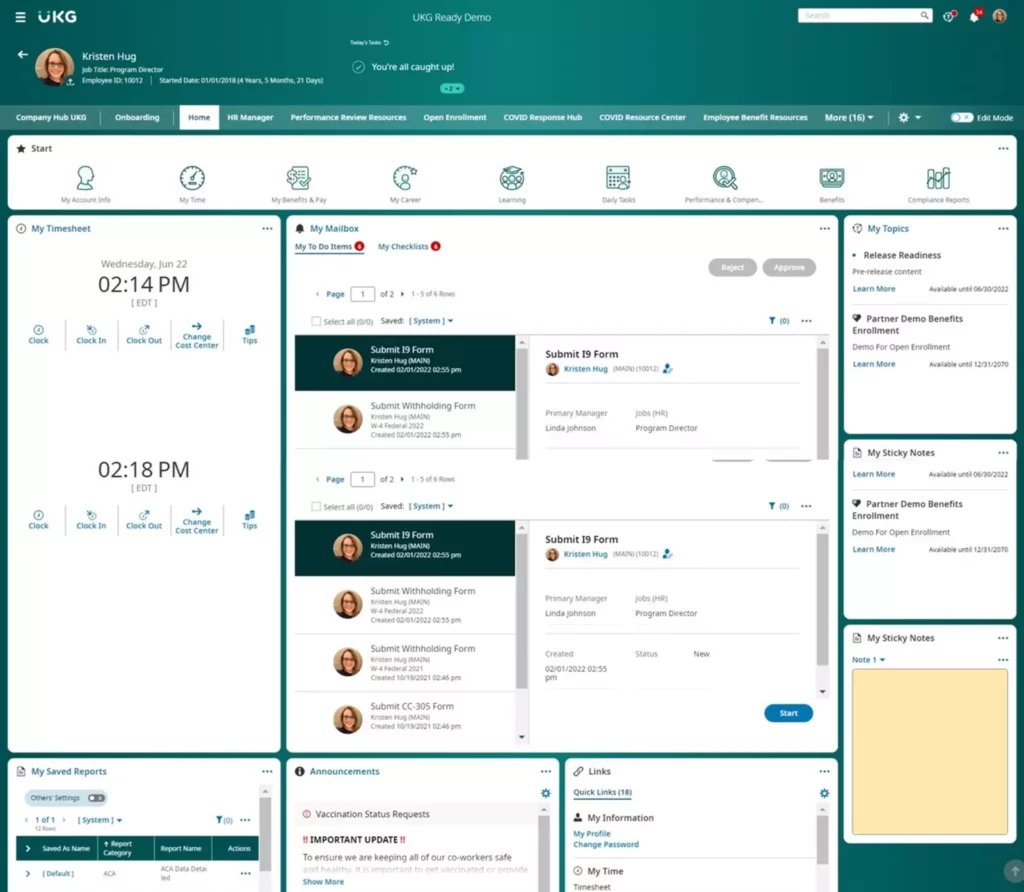
Unique Features:
- AI-driven HR tools.
- Workforce analytics and planning.
- Employee engagement surveys.
Pros | Cons |
Excellent for large-scale HR | Very expensive |
Deep analytics and AI insights | Complex onboarding |
Strong employee engagement focus | Not designed for small teams |
12. WorkTango
WorkTango specializes in employee engagement and recognition. Since hospitality depends heavily on motivated staff, this tool helps boost morale and reduce turnover.
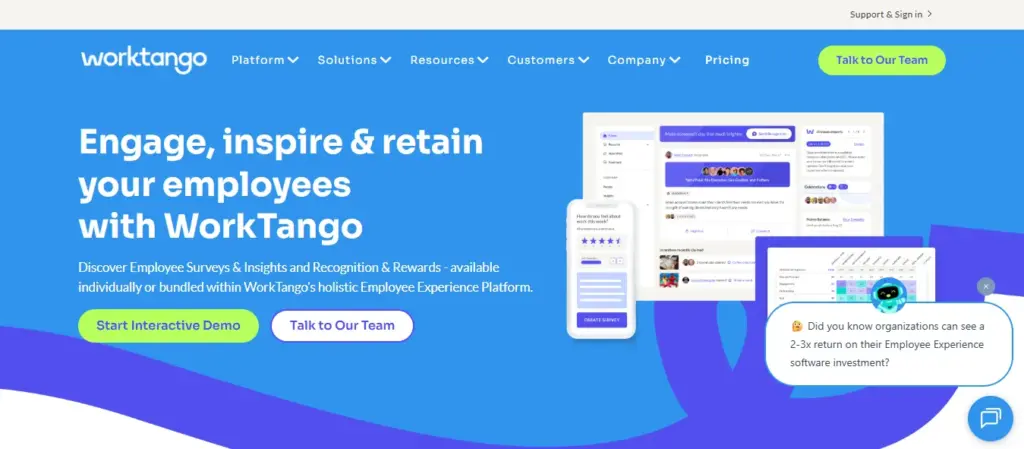
Unique Features:
- Recognition and rewards.
- Engagement surveys.
- Feedback and performance tools.
Pros | Cons |
Great for boosting retention | Not a complete HR suite |
Strong recognition features | Needs integration with payroll/HR |
Improves staff morale | No scheduling or compliance tools |
Why a Best HCM Software for Hospitality Industry is a Game-Changer
The hospitality sector is among the most people-centric industries globally. Visitors judge a hotel, restaurant, or resort based on the food or atmosphere but significantly based on the way staff members interact with them. For this reason, HR management in the hotel industry is of utmost importance.
But the catch is, managing hospitality people is more challenging than in most other industries. Why?
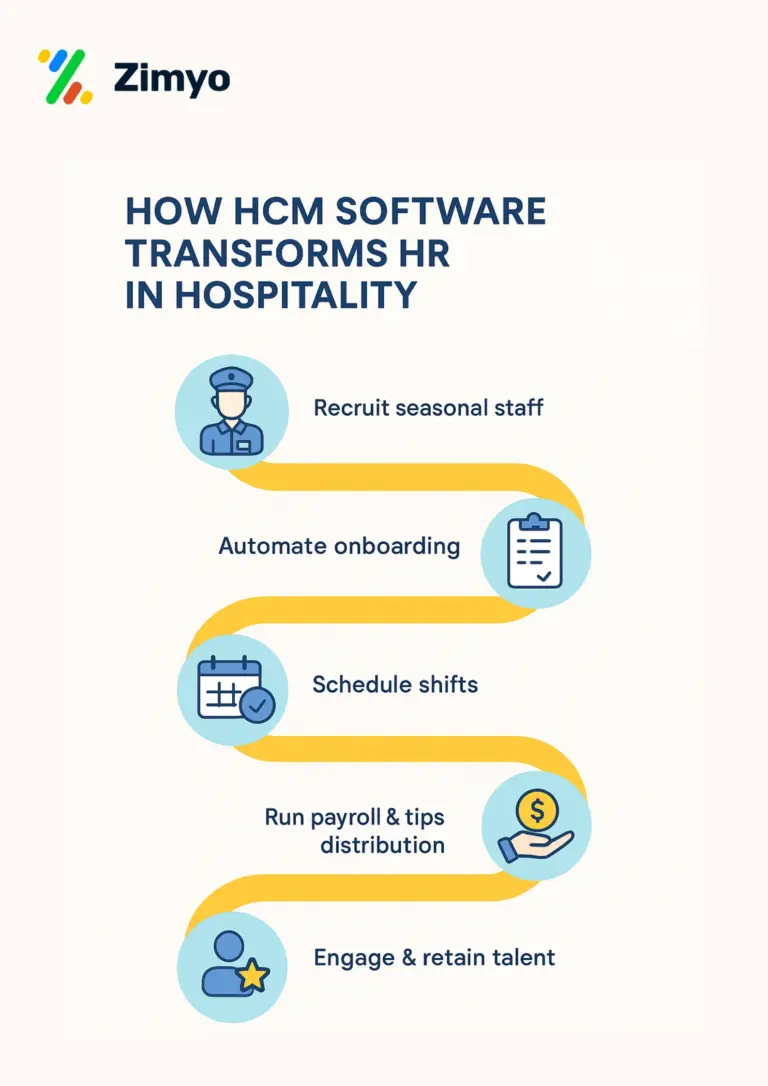
High turnover rates:
Research indicates hospitality industries tend to experience some of the highest turnover on the planet. Employees quit for more pay, better schedules, or reduced stress environments.
Seasonal hiring requirements:
Hotels and resorts experience varying demand with travel seasons, necessitating bulk hiring during peak times and cutting back later.
Complex payroll:
With various shifts, tips, and rules of compliance, payroll is far from simple.
Multi-location management:
Hospitality chains tend to operate multiple restaurants or hotels in cities or nations. Managing HR functions in these locations can become a mess.
Keeping the service standards high:
Employees become the face of the brand at the end of the day. Any disparity in training or morale has a direct impact on guest experience.
This is where best-of-breed HCM software comes into play. An effective HCM system:
- Economizes on repetitive HR work such as payroll, scheduling, and compliance.
- Enhances employee engagement and discourages turnover.
- Supports managers to make more informed decisions with analytics.
- Guarantees HR processes at all branches are uniform.
- Offers employees convenient access to their schedules, payslips, and training modules.
In brief, the proper HCM platform turns HR into a proactive, less reactive department to liberating hospitality leaders who spend more time on service excellence, not paperwork.
Over 60% of hotel staff work irregular or night shifts, making automated shift scheduling and attendance tracking in HCM systems a game-changer.
Must-Have Features in HCM Platform for Hospitality
When selecting human capital management software for your hotel, resort, or restaurant chain, not every platform will suit you. The hospitality industry is distinct, and your software must be. Below are the essentials that you should be searching for:
Recruitment & Onboarding
Hospitality companies recruit fast and sometimes dozens or even hundreds of employees in peak periods. A good HCM system must enable you to publish positions, monitor applications, execute background checks, and welcome staff easily.
Payroll & Compliance Management
Hospitality payroll is complicated by tips, fluctuating hours, and overtime. A good hospitality HR software must accurately calculate wages, accept multiple forms of payment, and adhere to local labor regulations.
Shift Scheduling & Workforce Management
Scheduling is one of the largest and most difficult challenges of the HRM in the hospitality sector. Your HCM system needs to enable managers to create, modify, and publish shifts in an efficient manner while providing employees with visibility and ease.
Learning & Training Modules
Guest service quality depends on well-trained employees. Look for an HCM platform that supports online training, certifications, and continuous learning so your staff stays motivated and skilled.
Performance Management
Managers need to evaluate staff performance regularly. From feedback surveys to KPIs, the right software should help track performance and reward top employees.
Employee Engagement Tools
Engaged employees translate to happy guests. Engagement tools such as surveys, appreciation, and rewards make employees feel appreciated and stem attrition.
Mobile Accessibility
In the hospitality industry, employees tend to be on the move and not at the back of offices. A mobile-based HCM solution means employees can review schedules, ask for leave, and view pay anytime. Zimyo offers complete mobile accessibility through Zimyo App.
Analytics & Reporting
To control multiple properties or big teams, decision-makers require information. The software must provide information about turnover, payroll expenses, scheduling productivity, and staff satisfaction
These factors streamline HR processes and fit ideally with the needs of human resource administration in hospitality business.
How to Select the Right HCM Software
With so many choices on the market, choosing the optimal HCM software for your hospitality company can be daunting. Here’s a straightforward step-by-step plan to assist you in making the correct decision:
Step 1: Determine Your Needs
A boutique hotel can’t use the same HCM system as an international resort chain. Begin by categorizing your pain points, understand – is payroll, recruitment, scheduling, or employee retention causing you headaches?
Step 2: Think Business Size & Scale
- Small hotels or restaurants → Low-cost, straightforward platforms
- Mid-size groups of hotels → All-around solutions
- Large business → Advanced systems such as Zimyo or UKG Pro.
Step 3: Assess User-Friendliness
Hospital staff are not necessarily tech-savvy and are busy. The platform must be intuitive and user-friendly.
Step 4: Inspect Integrations
Does the software connect with your POS (Point of Sale), payroll software, or time-tracking applications? This is important to ensure seamless operations.
Step 5: Consider Customization
Each hospitality company possesses special workflows. Select an HCM system that lets you customize workflows, reports, and levels of access.
Step 6: Compare Pricing & ROI
Budget is important, but don’t go with the lowest-cost option. Assess the return on investment based on decreased error rates, improved retention, and increased efficiency.
Step 7: Read Case Studies & Reviews
See how other resorts, hotels, or restaurants have gained from the platform. Real-life case studies are a treasure trove of knowledge.
By following these steps, you’ll ensure that your hospitality HR software fits your exact needs rather than becoming an expensive tool that goes unused.
Benefits of Using HCM Software
Investing in the Best HR Software for Restaurants comes with long-term benefits that directly impact both employees and the bottom line. Let’s look at them in detail:
1. Efficiency & Time Savings
Manual HR activities such as payroll computation, leave management, or employee information consume hours. An HCM tool automates these, freeing HR and managers’ time.
2. Better Employee Retention
With tools for engagement, recognition, and transparent career ladders, employees feel appreciated. This makes them less likely to turn over, which is one of the hospitality industry’s largest human resource management challenges.
3. Correct Payroll & Compliance
Payroll miscalculations can annoy employees. With automated payroll, employees get paid accurately and timely, and labor law compliance is maintained.
4. Improved Guest Experience
Content employees provide enhanced service. A motivated team directly correlates to enhanced guest satisfaction and brand loyalty.
5. Scalability
As your restaurant or hotel grows, your HCM system expands with it. You won’t have to change systems as you grow your business.
6. Data-Driven Decisions
Analytics detect trends such as why workers are departing, which shifts are too staffed, or how training affects service. Such insights inform improved strategic decisions.
7. Cost Savings
Decreasing errors, turnover, and inefficiencies is cost-saving. The return on investment in the best HCM software is large in the long term.
In a nutshell, the advantages go further than HR, they enhance business performance overall within the HRM in hospitality industry.
Final Thoughts
The hospitality business is a dynamic, service-focused industry where employee effectiveness directly affects guest satisfaction. Effective management of people is not merely about payroll or attendance, it’s about building a motivated, competent, and engaged workforce.
That’s why investing in the best HCM software is no longer optional, it’s essential. From small hotels to large enterprises, there’s an HCM platform for every need and budget. Some are all-rounders like Zimyo
Here’s the bottom line:
- If your business struggles with turnover, compliance, or scheduling, the right HCM system will simplify your challenges.
- If employee engagement is what you need to increase, Zimyo is an excellent choice.
- When global payroll and compliance are concerns, look to Deel or Zimyo for international business operations.
Behind it all, hospitality HR software guarantees that your employees are well cared for, so that they, in turn, can attend to your guests. And with hospitality, guests who are satisfied equal sustained success.
Frequently Asked Questions (FAQs)
What is the best hospitality management software?
The best hospitality management software is Zimyo HRMS for hospitality, offering HR, payroll, attendance, scheduling, and performance tools designed for hotels and restaurants.
Which HCM software is best?
The best HCM software depends on business size: Zimyo HRMS for growing and large companies, Workday HCM and Oracle HCM for global enterprises with complex needs. ullamcorper mattis, pulvinar dapibus leo.
What is HCM in hotels?
In hotels, HCM (Human Capital Management) refers to software that manages hiring, payroll, scheduling, attendance, performance, and employee engagement.
Which software is best for human resource management?
The best software for human resource management is Zimyo HRMS, known for comprehensive HR automation, payroll, compliance, recruitment, and performance tracking.


